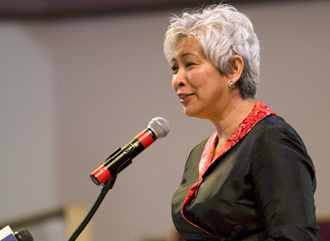Experts Examine Health Effects of Oil Disaster
Scientists are moving quickly to evaluate public health risks from the ongoing oil spill disaster in the Gulf of Mexico, says environmental policy analyst Dr. Maureen Lichtveld, professor and chair of the Department of Environmental Health Sciences.

Tulane environmental policy analyst Dr. Maureen Lichtveld helped organize the Institute of Medicine workshop, “Assessing the Human Health Effects of the Gulf of Mexico Oil Spill.” (Photo by Ryan Rivet)
Lichtveld, Freeport McMoRan Chair of Environmental Policy at the Tulane School of Public Health and Tropical Medicine, was one of the organizers of a workshop on health issues from the oil disaster. The session was held in New Orleans on June 22 and 23 by the Institute of Medicine.
Scientists and governmental officials who met, including Tulane alumna Dr. Regina Benjamin, U.S. Surgeon General, are developing a framework for action, Lichtveld said. They want to determine whether populations along the Gulf Coast are at risk of exposure and subsequent adverse health effects from volatile organic compounds through inhalation, ingestion or skin exposure.
The participants agreed on the urgency to establish baseline health information for medical surveillance of cleanup workers and for long-
term worker health monitoring. Significant data gaps exist, but future questions can be addressed if collection and banking of blood, urine and saliva is implemented now.
The workshop included an open-mike session with community members who voiced their concerns. Lichtveld said there are unique public health implications of the disaster stemming from historical health disparities among Gulf Coast residents higher prevalence of high blood pressure, heart disease, diabetes and cancer that were exacerbated by Hurricane Katrina.
“The degree to which these factors influence the health risk [of the oil disaster] is what we don't know yet,” Lichtveld said.
All of the scientists on the panels expressed concerns for psycho-social aspects including stress, depression, suicide, difficulty sleeping and family dysfunction, Lichtveld said.
“The health of the ecosystem is inextricably linked to the health of a population. The School of Public Health has a unique responsibility, and I take that seriously. We should accept nothing less than making science work for communities.”
